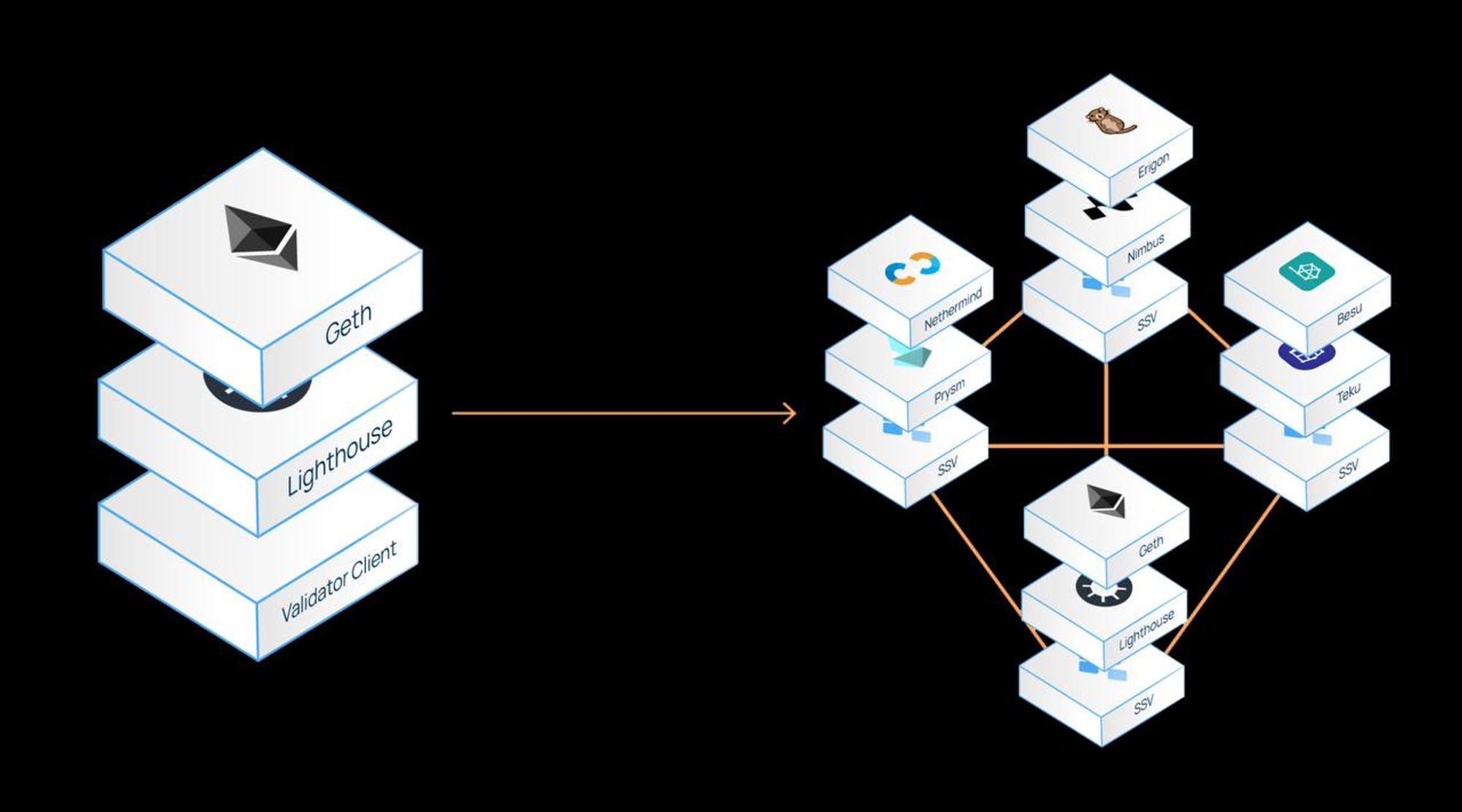In the bustling realm of blockchain, Ethereum has emerged as a beacon of innovation, promising to revolutionize industries and economies. Ensuring a secure staking ecosystem is pivotal.
As Ethereum’s stakes continue to rise, this blog post delves into the question: Is centralization compromising Ethereum staking security and decentralization? This blog post embarks on a journey to unravel the question: Is centralization truly impeding Ethereum staking? But more importantly, it brings forth the powerful answer in the form of Distributed Validator Technology (DVT).
The Dilemma of Security in Ethereum Staking:
Even as Ethereum transitioned from its proof-of-work (PoW) state to a proof-of-stake (PoS) consensus mechanism with the Ethereum 2.0 upgrade, the challenge of security and decentralization continues to be a focal point of concern.
Centralized staking systems can concentrate power and expose networks to potential security vulnerabilities. In a decentralized ecosystem like blockchain, control and validation confined to a few entities go against the foundational principles. Also, PoS promises enhanced efficiency, reduced energy consumption, and scalability, but centralization still poses a risk to these goals.
Traditional staking systems, often centralized, carry the potential for concentrated power and security vulnerabilities. The essence of blockchain’s decentralized ethos is challenged when control and validation are confined to a select few.
How DVT Empowers Security:
DVT’s security promise lies in its decentralized nature. Advanced cryptographic techniques fragment validation tasks, enabling validators to share partial blockchain data seamlessly. This collaborative validation process disperses security responsibilities across the network, eliminating the risks associated with centralization. Manipulation, collusion, and cyber threats become significantly harder in a system where no single entity holds dominion. DVT effectively ensures that security is woven into the very fabric of Ethereum’s staking ecosystem.
Understanding SSV DVT's Mechanism: DVT's Role in Decentralized Staking:
As the Ethereum community grapples with these concerns, Distributed Validator Technology (DVT) emerges as a beacon of hope. DVT is not just a solution; it’s a paradigm shift. The ssv.network has was developed as a trustless, permissionless, and ready-to-use validator infrastructure — powered by DVT. The protocol is built on a network of nodes that can distribute the operation of an ETH validator between 4 or even 13 nodes. This greatly improves the decentralization of Ethereum’s validator layer.
The protocol uses smart contracts to facilitate seamless customization and zero coordination of the nodes that maintain a distributed validator in the network.
Builders can also utilize smart contracts to develop innovative applications and tooling for staking. Since the protocol was constructed as a public good, the ssv.network is open and suited for everyone, from developers to solo stakers to institutions and service providers. Fast & Reusable staking infrastructure makes ssv.network a powerful platform for any staking-based use case.

DVT's Promise in Action: The Case of 01node ETH Staking Pool(beta):
The real-world manifestation of DVT’s power can be witnessed through the 01node staking pool. More than just a concept, the 01node staking pool embodies the ideals of decentralization and collaboration. It stands as a testament to the fact that DVT isn’t a distant dream; it’s a tangible reality making its mark on the Ethereum ecosystem. The introduction of our revolutionary Ethereum staking pool (beta) has eliminated the barrier of a substantial investment of 32 ETH, allowing individuals to stake any amount EVEN AS LOW AS 0.1 ETH (Goerli testnet).
Our Ethereum staking pool
Our Ethereum staking pool is an innovative platform that is built, using SSV network and Distributed Validator Technology to run our validators which aims to make staking accessible, user-friendly, and rewarding for everyone. The UI is simple and intuitive, yet users can do everyting they need to do to manage their stake and also see statistics about pool validators. The pool is managed by automated Oracles that track stacked balances, rewards and validators and through the pool Smart Contract. The pool validators are also automatically managed by the Oracles that track their beacon chain balances and also the execution layer balances.
As we move towards a more decentralized and accessible future, this staking pool beta serves as a catalyst for driving adoption, enhancing security, and empowering a broader community of Ethereum stakeholders. So, don’t miss out on this incredible opportunity to stake any amount and be part of the Ethereum revolution.
TRY IT OUT: Link [ Special gift for every testnet user].
Getting Involved with the SSV Network:
The ssv.network ecosystem is composed of 3 types of actors: stakers, operators and DAO members.
Stakers
Services or individual ETH holders that leverage SSV/DVT technology for optimal liveness, security, and decentralization of their validator(s). Stakers pay a fee in SSV tokens to operators for managing their validator(s).
Operators
Operators provide the hardware infrastructure, run the SSV protocol, and are responsible for maintaining validators and the overall health of ssv.network. Operators determine their fees for services in SSV tokens and charge stakers for operating and maintaining their validator(s).
DAO
The ssv.network DAO decentralises ownership and governance of the ssv.network protocol and treasury, with SSV being the native token of the network. DAO exercises its mandate by two main mechanisms, executing governance functions and executing snapshot proposals passed by the token holders.
Conclusion
The security complexities surrounding Ethereum’s journey are met with an ingenious solution – Distributed Validator Technology. Ethereum’s path from centralization to genuine decentralization is marked by innovation. The Distributed Validator Technology (DVT) within the SSV protocol shines as a guiding light, reshaping validator synchronization and verification.
With ssv.network providing the infrastructure, builders can focus on innovation, creating new products, and bringing them to market. The more applications built on ssv.network, the greater the network effect and robustness for everyone participating.
Learn more: Link

